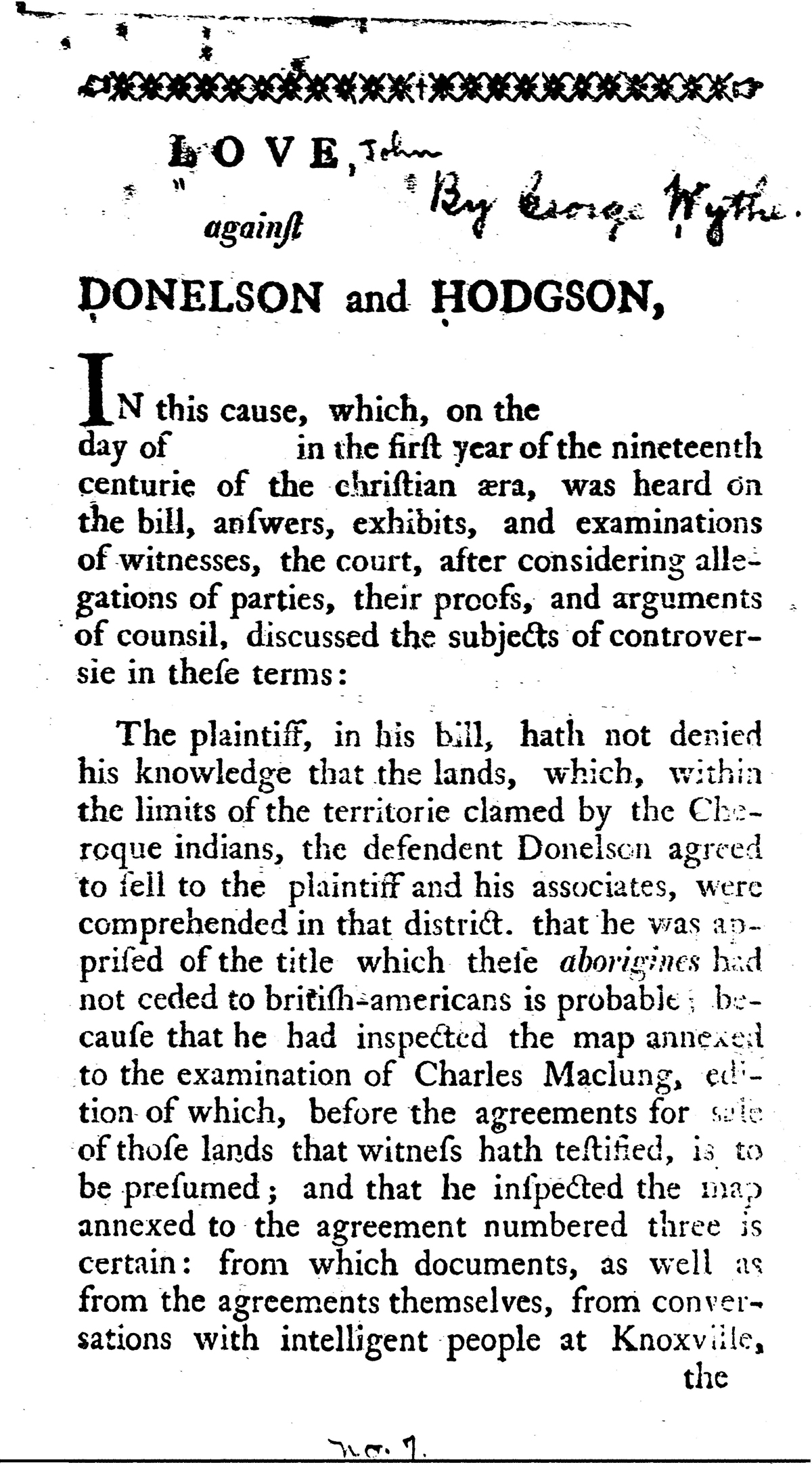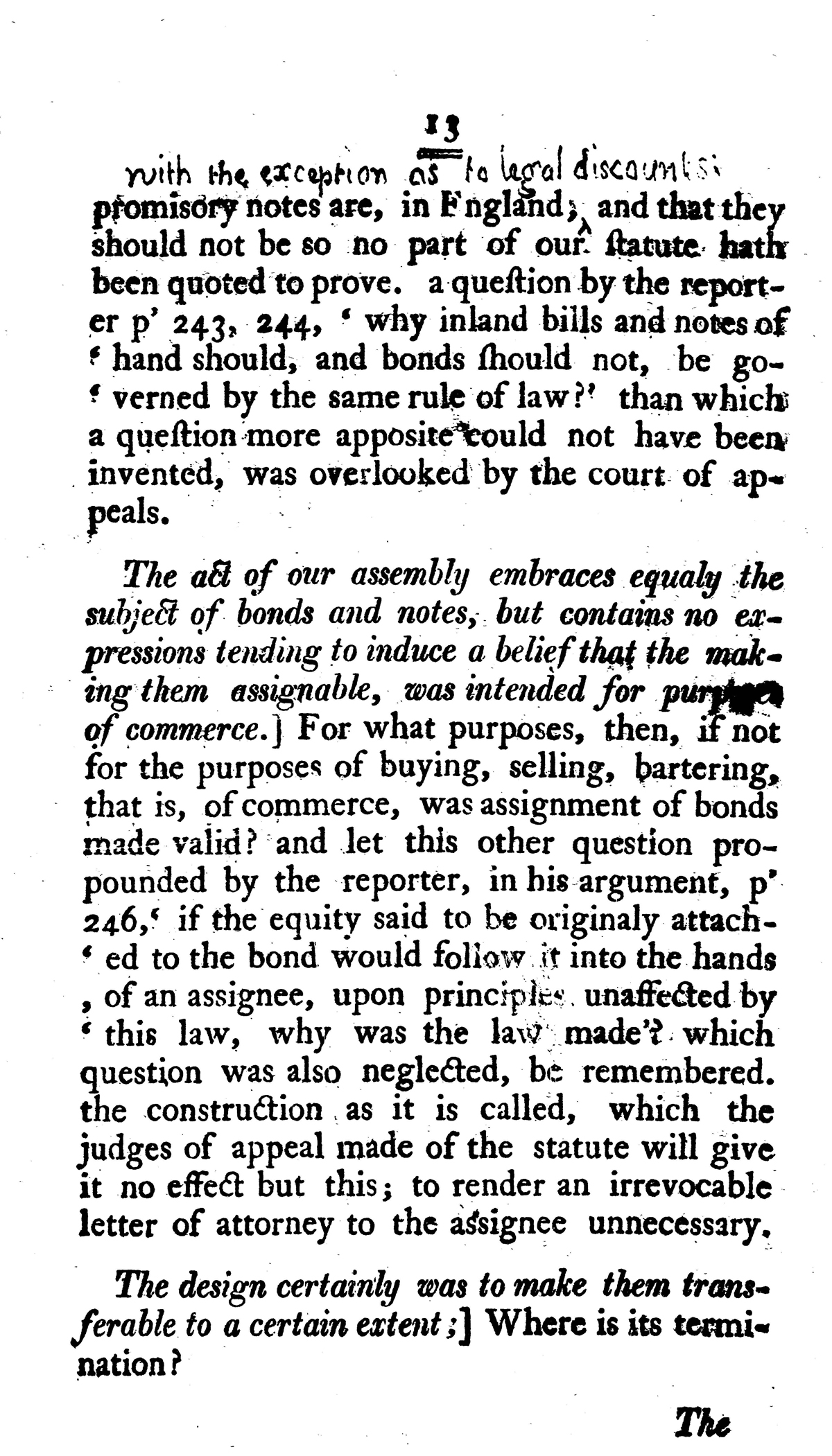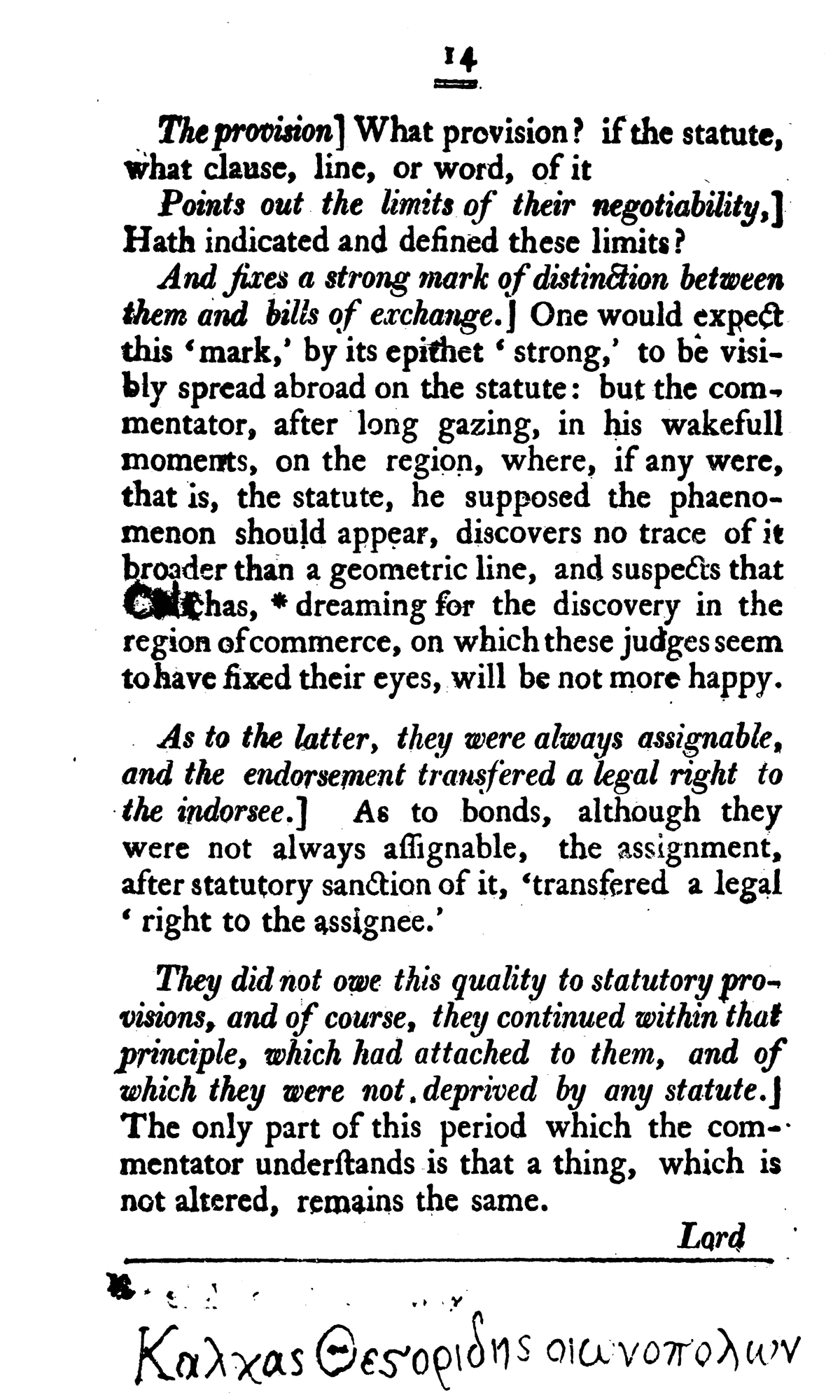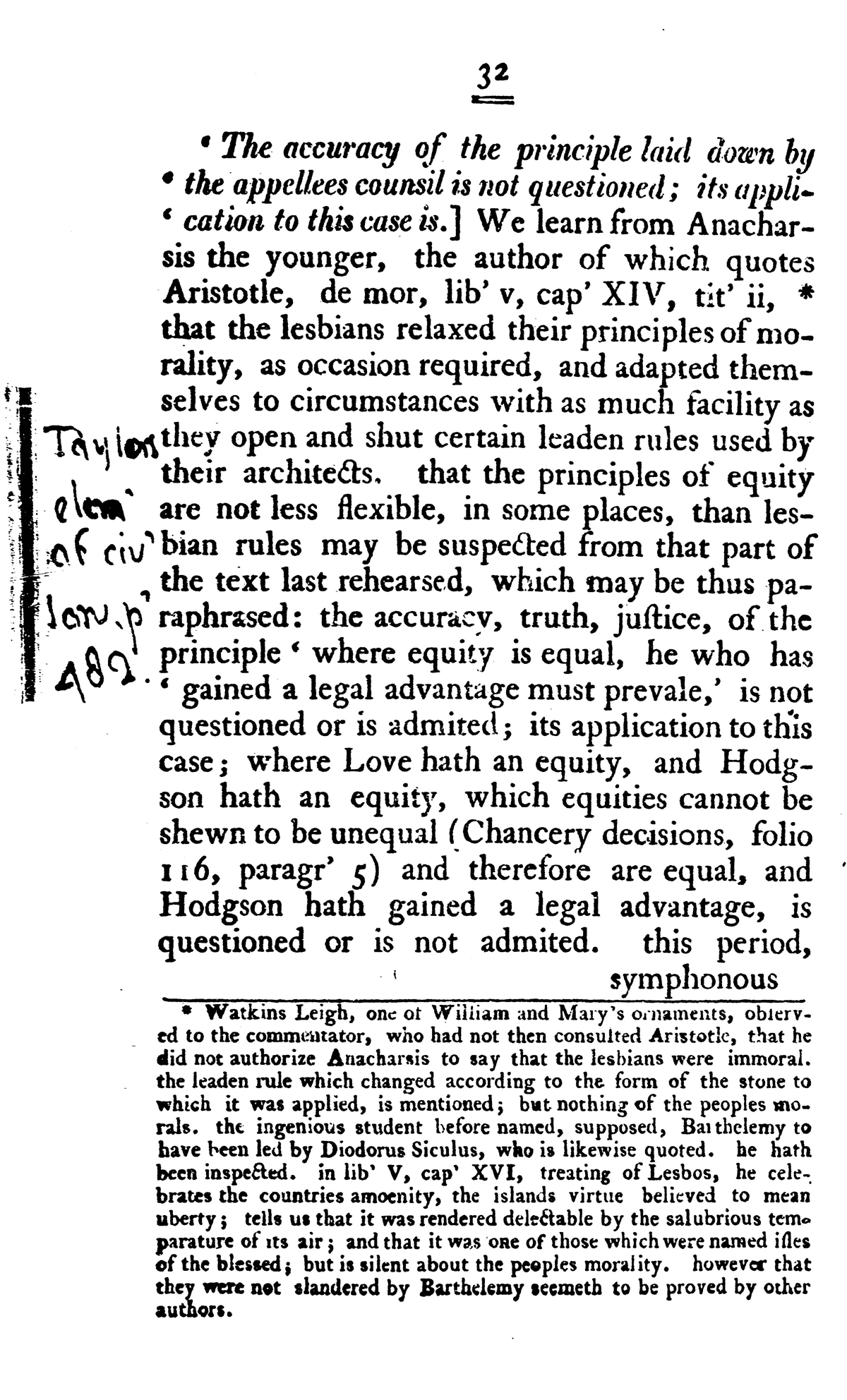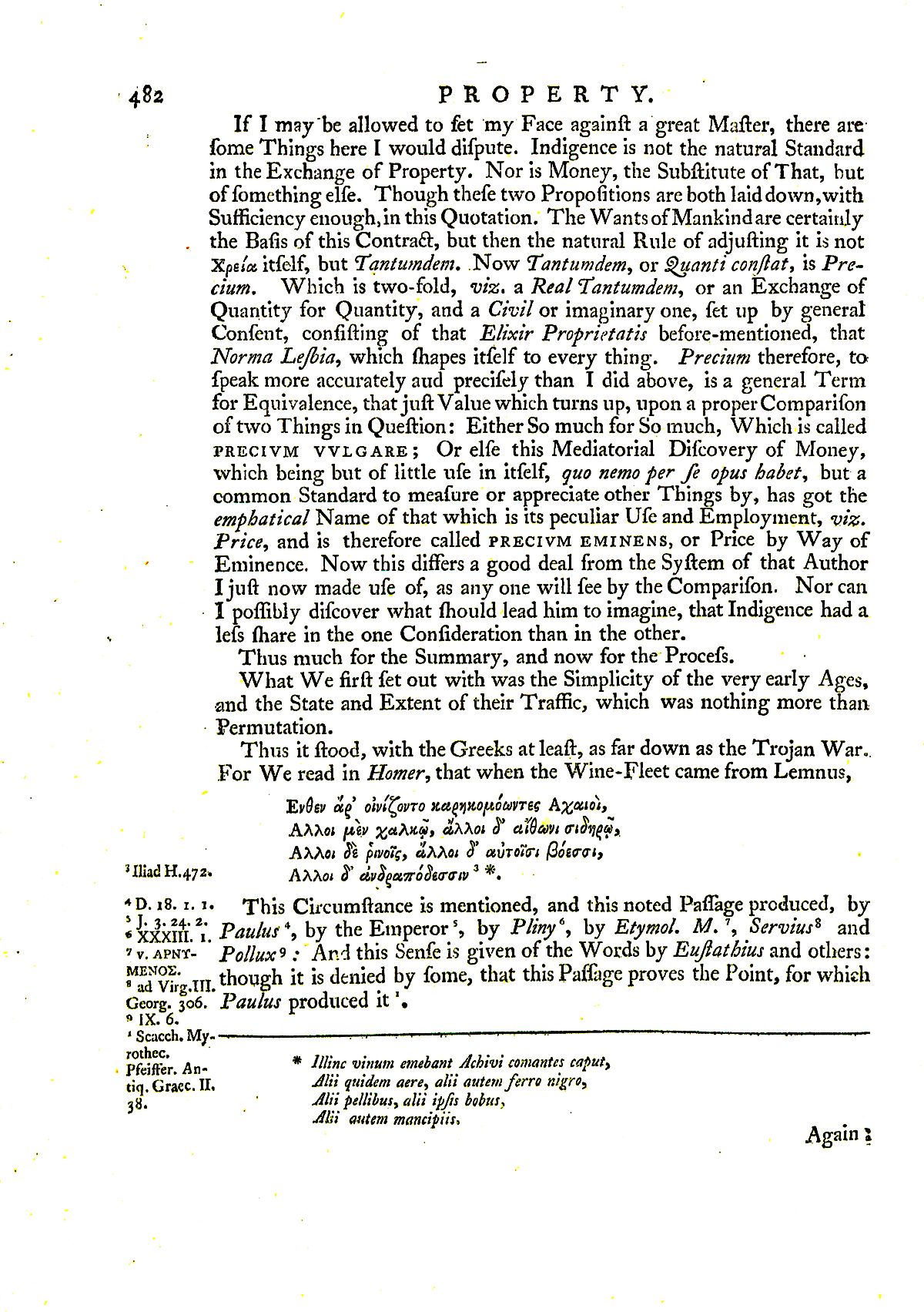Difference between revisions of "Love against Donelson"
| Line 1: | Line 1: | ||
{{DISPLAYTITLE:''Love, against Donelson and Hodgson''}} | {{DISPLAYTITLE:''Love, against Donelson and Hodgson''}} | ||
| − | + | <big>'''by George Wythe'''</big> | |
| − | |||
{{NoBookInfoBox | {{NoBookInfoBox | ||
|shorttitle=Love against Donelson | |shorttitle=Love against Donelson | ||
| Line 18: | Line 17: | ||
|desc=8vo (21 cm.) | |desc=8vo (21 cm.) | ||
}} | }} | ||
| + | <div style="float: left; margin: 0px 30px 15px 0px;">__TOC__</div> | ||
''[[Media:WytheLoveAgainstDonelson1801.pdf|Love, against Donelson and Hodgson]]'' is a published opinion by [[George Wythe]], for the case ''[[Love v. Donelson]]'' in Virginia's High Court of Chancery.<ref>George Wythe, ''[[Media:WytheLoveAgainstDonelson1801.pdf|Love, against Donelson and Hodgson]]'' (Richmond, VA: Thomas Nicolson, 1801?).</ref> The report was published in pamphlet form in 1801 or later—almost certainly printed by Thomas Nicholson of Richmond, Virginia, who had published [[Decisions of Cases in Virginia by the High Court of Chancery|Wythe's Reports]] in 1795, and at least seven other supplements for Wythe, in 1796 and after.<ref>Charles Evans, in his ''[[American Bibliography]],'' vol. 11 (1942), mistakenly gives the date of publication as 1796. Wythe states that the case took place in the "first year of the nineteenth centurie"; it is the opinion of the editors that the Chancellor would have understood that the new century began January 1, 1801, and therefore ''Love against Donelson'' must have been published sometime between 1801 and the year of Wythe's death, in 1806.</ref> ''Love v. Donelson'' was not reported in the second edition of Wythe's Reports, in 1852.<ref>Benjamin Blake Minor, ed., [https://books.google.com/books?id=mostAQAAMAAJ&pg=PR41''Decisions of Cases In Virginia, By the High Court Chancery, with Remarks Upon Decrees By the Court of Appeals, Reversing Some of Those Decisions,''] by George Wythe (Richmond, Virginia: J.W. Randolph, 1852), xli.</ref><ref>Minor had access to a bound volume of pamphlets which had belonged to James Madison, and was then in the possession of William Green of Culpeper, Virginia. The ''Catalogue of the Choice and Extensive Law and Miscellaneous Library of the late Hon. William Green, LL.D.,... to be sold by Auction, January 18th, 1881, at Richmond, VA.'' (Richmond: John E. Laughton, Jr., 1881), lists the volume as follows (p. 200). Mysteriously missing from the catalogue, however, is an entry for ''[[Between Yates and Salle]],'' specifically mentioned by Minor to have been issued as a pamphlet, presumably provided by Green ([https://books.google.com/books?id=mostAQAAMAAJ&pg=PA163 Minor, p. 163]). | ''[[Media:WytheLoveAgainstDonelson1801.pdf|Love, against Donelson and Hodgson]]'' is a published opinion by [[George Wythe]], for the case ''[[Love v. Donelson]]'' in Virginia's High Court of Chancery.<ref>George Wythe, ''[[Media:WytheLoveAgainstDonelson1801.pdf|Love, against Donelson and Hodgson]]'' (Richmond, VA: Thomas Nicolson, 1801?).</ref> The report was published in pamphlet form in 1801 or later—almost certainly printed by Thomas Nicholson of Richmond, Virginia, who had published [[Decisions of Cases in Virginia by the High Court of Chancery|Wythe's Reports]] in 1795, and at least seven other supplements for Wythe, in 1796 and after.<ref>Charles Evans, in his ''[[American Bibliography]],'' vol. 11 (1942), mistakenly gives the date of publication as 1796. Wythe states that the case took place in the "first year of the nineteenth centurie"; it is the opinion of the editors that the Chancellor would have understood that the new century began January 1, 1801, and therefore ''Love against Donelson'' must have been published sometime between 1801 and the year of Wythe's death, in 1806.</ref> ''Love v. Donelson'' was not reported in the second edition of Wythe's Reports, in 1852.<ref>Benjamin Blake Minor, ed., [https://books.google.com/books?id=mostAQAAMAAJ&pg=PR41''Decisions of Cases In Virginia, By the High Court Chancery, with Remarks Upon Decrees By the Court of Appeals, Reversing Some of Those Decisions,''] by George Wythe (Richmond, Virginia: J.W. Randolph, 1852), xli.</ref><ref>Minor had access to a bound volume of pamphlets which had belonged to James Madison, and was then in the possession of William Green of Culpeper, Virginia. The ''Catalogue of the Choice and Extensive Law and Miscellaneous Library of the late Hon. William Green, LL.D.,... to be sold by Auction, January 18th, 1881, at Richmond, VA.'' (Richmond: John E. Laughton, Jr., 1881), lists the volume as follows (p. 200). Mysteriously missing from the catalogue, however, is an entry for ''[[Between Yates and Salle]],'' specifically mentioned by Minor to have been issued as a pamphlet, presumably provided by Green ([https://books.google.com/books?id=mostAQAAMAAJ&pg=PA163 Minor, p. 163]). | ||
<blockquote> | <blockquote> | ||
| Line 48: | Line 48: | ||
DONELSON and HODGSON, | DONELSON and HODGSON, | ||
| − | IN this cause, which, on the day of & | + | IN this cause, which, on the day of in the first year of the nineteenth centurie of the christian æra, was heard on the bill, answers, exhibits, and examinations of witnesses, the court, after considering allegations of parties, their proofs, and arguments of counsil, discussed the subjects of controversie in these terms: |
The plaintiff, in his bill, hath not denied his knowledge of that lands, which, within the limits of the territorie clamed by the Cheroque indians, the defendent Donelson agreed to fell to the plaintiff and his associates, were comprehended in that district. that apprised of the title which these ''aborigines'' had not ceded to british-americans is probable; because that he had inspected the map annexed to the examination of Charles Maclung, edition of which, before the agreements for sale of those lands that witness hath testified, is to be presumed; and that he inspected the map annexed to the agreement numbered three is certain: from which documents, as well as from the agreements themselves, from conversations with intelligent people at Knoxville,<div align="right">the</div> | The plaintiff, in his bill, hath not denied his knowledge of that lands, which, within the limits of the territorie clamed by the Cheroque indians, the defendent Donelson agreed to fell to the plaintiff and his associates, were comprehended in that district. that apprised of the title which these ''aborigines'' had not ceded to british-americans is probable; because that he had inspected the map annexed to the examination of Charles Maclung, edition of which, before the agreements for sale of those lands that witness hath testified, is to be presumed; and that he inspected the map annexed to the agreement numbered three is certain: from which documents, as well as from the agreements themselves, from conversations with intelligent people at Knoxville,<div align="right">the</div> | ||
Revision as of 09:05, 26 March 2015
by George Wythe
| Love against Donelson | ||
|
at the College of William & Mary. |
||
| Author | George Wythe | |
| Published | n.p. (Richmond, VA?): n.p. (Thomas Nicolson?) | |
| Date | n.d. (1801?) | |
| Language | English | |
| Pages | 34 | |
| Desc. | 8vo (21 cm.) | |
Love, against Donelson and Hodgson is a published opinion by George Wythe, for the case Love v. Donelson in Virginia's High Court of Chancery.[1] The report was published in pamphlet form in 1801 or later—almost certainly printed by Thomas Nicholson of Richmond, Virginia, who had published Wythe's Reports in 1795, and at least seven other supplements for Wythe, in 1796 and after.[2] Love v. Donelson was not reported in the second edition of Wythe's Reports, in 1852.[3][4]
Evidence for Inclusion in Wythe's Library
Upon his death, a copy of this pamphlet which had belonged to Wythe was bequeathed with his books to Thomas Jefferson. Jefferson had the pamphlet bound into a volume with seven of Wythe's other Chancery decisions which were published as supplements.[5] Subsequently, the volume became part of the collection at the Library of Congress, titled on the spine: Wythe's Reports. Supplement. Virginia. 1796-99 (despite this case taking place in 1801).[6] The pamphlet for Love against Donelson has a handwritten notation, "no. 7," on the first page.
Several pages of the pamphlet contain manuscript corrections by Wythe in his hand, including a footnote in Greek, apparently scraped off and corrected to 'Κάλχας Θεστορίδης οἰωνοπόλων': "Calchas, son of Thestor, far the best of augurs" (bird-diviners).[7] On another page Wythe made a notation in the margin referring to Taylor's Elements of the Civil Law (1769).[8]
Page one from Wythe's pamphlet, "Love, Against Donelson and Hodgson" (1801?). Copy at the Library of Congress.
Page 13 from Wythe's pamphlet, "Love, Against Donelson and Hodgson" (1801?). Copy at the Library of Congress.
Page 14 from Wythe's pamphlet, "Love, Against Donelson and Hodgson" (1801?), with Wythe's correction for the footnote: Κάλχας Θεστορίδης οἰωνοπόλων. Copy at the Library of Congress.
Page 32 from Wythe's pamphlet, "Love, Against Donelson and Hodgson" (1801?). Copy at the Library of Congress.
Page 482 of the third edition of John Taylor's Elements of the Civil Law (London: Charles Bathurst, 1769), with Wythe's reference to the "Norma Lesbia, which shapes itself to every thing."
Document text, 1801
Page 1
LOVE,
against
DONELSON and HODGSON,
IN this cause, which, on the day of in the first year of the nineteenth centurie of the christian æra, was heard on the bill, answers, exhibits, and examinations of witnesses, the court, after considering allegations of parties, their proofs, and arguments of counsil, discussed the subjects of controversie in these terms:
The plaintiff, in his bill, hath not denied his knowledge of that lands, which, within the limits of the territorie clamed by the Cheroque indians, the defendent Donelson agreed to fell to the plaintiff and his associates, were comprehended in that district. that apprised of the title which these aborigines had not ceded to british-americans is probable; because that he had inspected the map annexed to the examination of Charles Maclung, edition of which, before the agreements for sale of those lands that witness hath testified, is to be presumed; and that he inspected the map annexed to the agreement numbered three is certain: from which documents, as well as from the agreements themselves, from conversations with intelligent people at Knoxville,the
Page 2
References
- ↑ George Wythe, Love, against Donelson and Hodgson (Richmond, VA: Thomas Nicolson, 1801?).
- ↑ Charles Evans, in his American Bibliography, vol. 11 (1942), mistakenly gives the date of publication as 1796. Wythe states that the case took place in the "first year of the nineteenth centurie"; it is the opinion of the editors that the Chancellor would have understood that the new century began January 1, 1801, and therefore Love against Donelson must have been published sometime between 1801 and the year of Wythe's death, in 1806.
- ↑ Benjamin Blake Minor, ed., Decisions of Cases In Virginia, By the High Court Chancery, with Remarks Upon Decrees By the Court of Appeals, Reversing Some of Those Decisions, by George Wythe (Richmond, Virginia: J.W. Randolph, 1852), xli.
- ↑ Minor had access to a bound volume of pamphlets which had belonged to James Madison, and was then in the possession of William Green of Culpeper, Virginia. The Catalogue of the Choice and Extensive Law and Miscellaneous Library of the late Hon. William Green, LL.D.,... to be sold by Auction, January 18th, 1881, at Richmond, VA. (Richmond: John E. Laughton, Jr., 1881), lists the volume as follows (p. 200). Mysteriously missing from the catalogue, however, is an entry for Between Yates and Salle, specifically mentioned by Minor to have been issued as a pamphlet, presumably provided by Green (Minor, p. 163).
2325. WYTHE'S REPORTS. Aylett & Aylett, Richmond: 1796; Field & Harrison, Richmond: 1796. WYTHE (GEO.). Case upon the Statute for Distribution, Richmond: 1796. Wilkins & John Taylor, et als.; Fowler & Saunders. In one vol., 12mo. Auto. of President James Madison. Ms. notes. A rare collection of the Original Imprints, supposed by the late possessor to be unique.
- ↑ "Six tracts originally bound together in calf for Jefferson by Milligan on June 30, 1807 (cost $1.00). Rebound in Buckram for the Library of Congress." E. Millicent Sowerby, comp., Catalogue of the Library of Thomas Jefferson (Washington, D.C.: Library of Congress, 1953), 2:208.
- ↑ Library of Congress catalog record. This volume contains pamphlets for: Case upon the Statute for Distribution (1796); Field v. Harrison (1794); Fowler v. Saunders and Goodall v. Bullock (1798, together in the same pamphlet); Wilkins v. Taylor (1799); Yates v. Salle (1792); and Love v. Donelson (1801). See also: Aylett v. Aylett (1793), and Overton v. Ross (1803).
- ↑ Calchas was the prophet of Troy. Homer, Iliad 1.69.
- ↑ "Manuscript notes by Wythe." Sowerby, 2:209.
See also
- American Bibliography
- Between Fowler and Saunders
- Between Wilkins and Taylor
- Between Yates and Salle
- The Case of Overtons Mill: Prolegomena
- Case upon the Statute for Distribution (pamphlet)
- Love v. Donelson
- Report of the Case between Aylett and Aylett
- Report of the Case between Field and Harrison
External links
- Library of Congress catalog record.
- Sowerby Catalogue, at HathiTrust.

